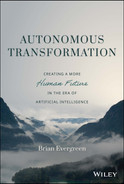CHAPTER 5
Requiem for the Industrial Revolution: Rehumanizing Work
In the world of classical music, epochs have built upon the work of one another. Melodies, progressions, rhythms, instruments, vocal and instrumental pedagogy—they have evolved and been passed down from generation to generation through written, performed, and, more recently, recorded tradition. Arguably, the epoch of classical music that has left the most far‐reaching impression on the way we experience music is the Romantic era, in which performers first began to interpret music through their own emotional connection to the notes and melodies, accelerating or decelerating as best fit their interpretation.
This paradigm shift is so embedded in the way humans experience music in the post‐Romantic era that musicians from all over the world have recast music from epochs that predate the Romantic era, such as the Renaissance, Baroque, and Classical eras, through the Romantic lens of interpretation. Musical purists find this phenomenon frustrating, because they would prefer to hear Baroque music, for example, as it was intended and would have been played at that time, following a consistent tempo, celebrating precision, with no concept of speeding up or slowing down individual passages.
Another example of the Romantic era's impact on society and even our mental constructs regarding art and music is the elevation of the artist. Before the Romantic era, being a classical composer in Europe was a trade, having evolved from the time of the bards, cultural ceremonial music, and music in the context of the church to a modest, but funded, position in service of the church, a noble, or a royal benefactor. Johann Sebastian Bach, one of the most famous names in the history of music, did not become wealthy from the more than 11,000 compositions he produced in his lifetime. His varied use of instruments within his compositions was not the product of genius, but of the farmers who made it to rehearsal any given week and committed to be at the church that weekend, and the instruments they played. Rather, his genius lay in his endless ability to compose beautiful, cohesive works of music incorporating varied instrumentation in a short period of time.
The Romantic era changed this paradigm for all artists, represented famously in a letter Beethoven left behind when he broke ties with a former benefactor: “Prince, what you are, you are through chance and birth; what I am, I am through my own labor. There are many princes and there will continue to be thousands more, but there is only one Beethoven.”1
The aftereffects of this shift in worldview are so prevalent that they would be difficult to unwind. Deconstructing the concept of artists back into a pre‐Romantic view would mean a context in which painters have no prospect of achieving wealth, but can make a modest living by painting portraits and commissions for the wealthy, poets write love sonnets for the wealthy, composers set them to music, and so on. Each returns to their humble home at the end of a long day (that is, if they do not live at the home of the noble or royal together with their family) where their craft has yielded just enough wages to put food on the table, much like the rest of the hired staff of a given estate. This would be as if Sir Paul McCartney lived at Buckingham Palace, solely performed for the royal family and their guests, and did not make enough wages to rent his own flat.
This is the magnitude of the mindset shift required of leaders in the twenty‐first century. The Industrial Revolution has been deeply threaded into the way we think about, talk about, approach, and manage organizations, initiatives, teams, and systems.
The evolutionary trajectory of the Industrial Revolution has met its logical resting place (requiem is Latin for “rest,” and the name of the Catholic Mass for the laying of souls to rest in the context of a funeral). Those who endeavor to lead the ongoing progression of societal growth are coining new cycles of the Industrial Revolution (e.g., Industry x.0), but what they are describing, even in Industry 4.0, while a strong vision for the future of organizations, has not and will not transform society to the degree envisioned, much less create a more human future, through the vehicle of the Industrial Revolution.
The time has come to break out of the local minutiae of the Industrial Revolution. It is time for a decisive, worldwide shift toward a new way of thinking about, talking about, approaching, and managing organizations, initiatives, teams, and systems.
Artificial intelligence and its adjacent technologies highlight the need for a new way of thinking and working as well as create an opportunity to extend human capability and positively change the nature of work.
In 1911, Frederick Taylor, the creator of Scientific Management, and a key influencer of management thinking throughout the twentieth century and the early twenty‐first century, said, “In the past the man has been first; in the future the system must be first.”
Over 100 years later, we are a new breed of humanity, armed with knowledge of the entire world at our fingertips, wisdom handed down through the invention of video and audio recording combined with increased longevity, and we walk around with more power in our pockets and on our wrists than it took to send the first humans to the moon.
Whether you are a member of the executive leadership team of an organization, a manager, an individual contributor, a researcher, or a student, if you believe that we can do better—that we can create a more human future—the rest of this book will walk you through a set of tools and frameworks for beginning to disentangle from the Industrial Revolution, as well as a path forward in the direction of a more human future built on the foundation of Profitable Good.
Note
- 1 Rick Fulker, “Why Beethoven Snubbed Princes and Put His Music First,” DW, September 12, 2016, https://www.dw.com/en/why-beethoven-snubbed-princes-and-put-his-music-first/a-19544501.
